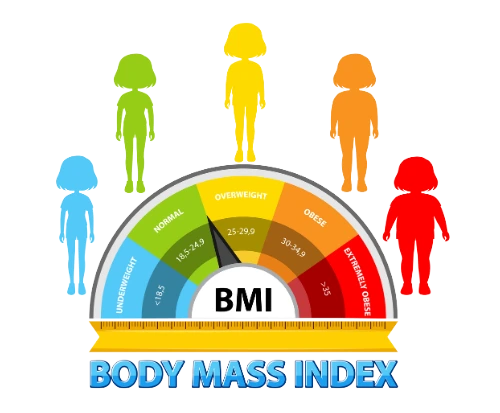BMI Calculator : Check If You’re Overweight, Underweight or Healthy
Don't let obesity take away your health and independence. Start building a healthier life

Quick and Easy BMI Calculation
Find out if your weight is in a healthy range with our simple BMI calculator. Just enter your height and weight to get instant results that help you take control of your health.
What is BMI?
Body Mass Index (BMI) is a simple, widely used measure to understand if your body weight is appropriate for your height. It helps identify whether you're underweight, normal, overweight, or obese. While it's not a direct measure of body fat, BMI gives a general idea of your health risk associated with weight. Knowing your BMI can be the first step toward better fitness and a healthier lifestyle.
How Does Our BMI Calculator Work?
Our BMI calculator uses a medically accepted formula: weight (in kilograms) divided by height (in meters squared). Just input your height and weight, and the tool instantly tells you your BMI value along with its category underweight, normal, overweight, or obese. This user-friendly tool is based on WHO standards and suitable for both men and women over the age of 18.
Why Should You Know Your BMI?
Knowing your BMI is crucial in detecting early signs of weight-related health risks like heart disease, diabetes, and high blood pressure. It acts as a health indicator and helps you make informed decisions about your diet, exercise, and overall lifestyle. Monitoring BMI regularly enables you to track changes and take corrective action before complications arise.
BMI Ranges and What They Mean
BMI values fall into specific categories that help define your weight status. These ranges are based on global health standards. Being underweight or overweight can affect your energy levels, immunity, and long-term health. Knowing which category you fall into is the first step in creating a healthier you.
BMI Classification Table:
| BMI Range | Category |
|---|---|
| Below 18.5 | Underweight |
| 18.5 – 24.9 | Normal/Healthy |
| 25.0 – 29.9 | Overweight |
| 30.0 – 34.9 | Obese Class I |
| 35.0 – 39.9 | Obese Class II |
| 40.0 and above | Obese Class III |
BMI & Obesity Risk Chart:
| BMI | Health Risk |
|---|---|
| <18.5 | Nutritional Deficiency, Weak Immunity |
| 18.5–24.9 | Lowest Risk (Healthy) |
| 25–29.9 | Moderate Risk – Overweight |
| 30–34.9 | High Risk – Obesity I |
| 35–39.9 | Very High Risk – Obesity II |
| ≥40 | Extremely High Risk – Obesity III |
Beyond BMI: Factors That Impact Your Health
BMI is just one part of the health equation. Factors like waist circumference, muscle mass, fat percentage, age, gender, genetics, and lifestyle habits also impact your overall health. For example, athletes may have high BMIs due to muscle mass, not fat. Always pair BMI results with a full health check-up for an accurate picture.
BMI Calculation for Adults vs. Children
BMI interpretation differs for children and adults. For adults, fixed ranges apply. For children and teens, BMI is age- and sex-specific and is compared against growth charts. Pediatricians use BMI percentiles to assess if a child is growing at a healthy rate. Always consult a doctor for accurate BMI analysis in children.
Tips to Achieve a Healthy BMI
To maintain or reach a healthy BMI, focus on balanced nutrition, regular physical activity, and adequate sleep. Include more fiber, fruits, vegetables, and whole grains in your meals. Avoid crash diets and stay hydrated. Track your progress and consult healthcare professionals for guidance that fits your lifestyle and medical history.
Why Choose DocGenie for Your Health Needs?
At DocGenie, your health is our priority. We offer access to experienced doctors who guide you with accurate BMI insights and personalized plans. Unlike other platforms, you can choose your doctor before booking, ensuring the best care for your needs. Start your health journey with trusted professionals—online or in-clinic.
A BMI calculator is a tool that uses your height and weight to estimate body fat and categorize your weight status.
You need your current weight (in kilograms) and height (in centimeters or meters).
Your BMI result indicates whether you are underweight, healthy, overweight, or obese based on standard ranges.
Not always. Athletes may have high BMIs due to muscle mass, which isn’t body fat. Additional tests are needed for accuracy.
The healthy BMI range for adults is 18.5 to 24.9.
BMI calculations are the same, but fat distribution and muscle mass can differ, which may affect health interpretation.
Yes, but BMI for children is interpreted differently using growth charts based on age and sex.
High BMI can increase the risk of diabetes, heart disease, stroke, joint issues, and some cancers.
Once every 3–6 months or as advised by your healthcare provider, especially if you're on a weight management plan.
Consult a doctor or dietitian for a tailored plan. Focus on healthy eating, exercise, and lifestyle changes.